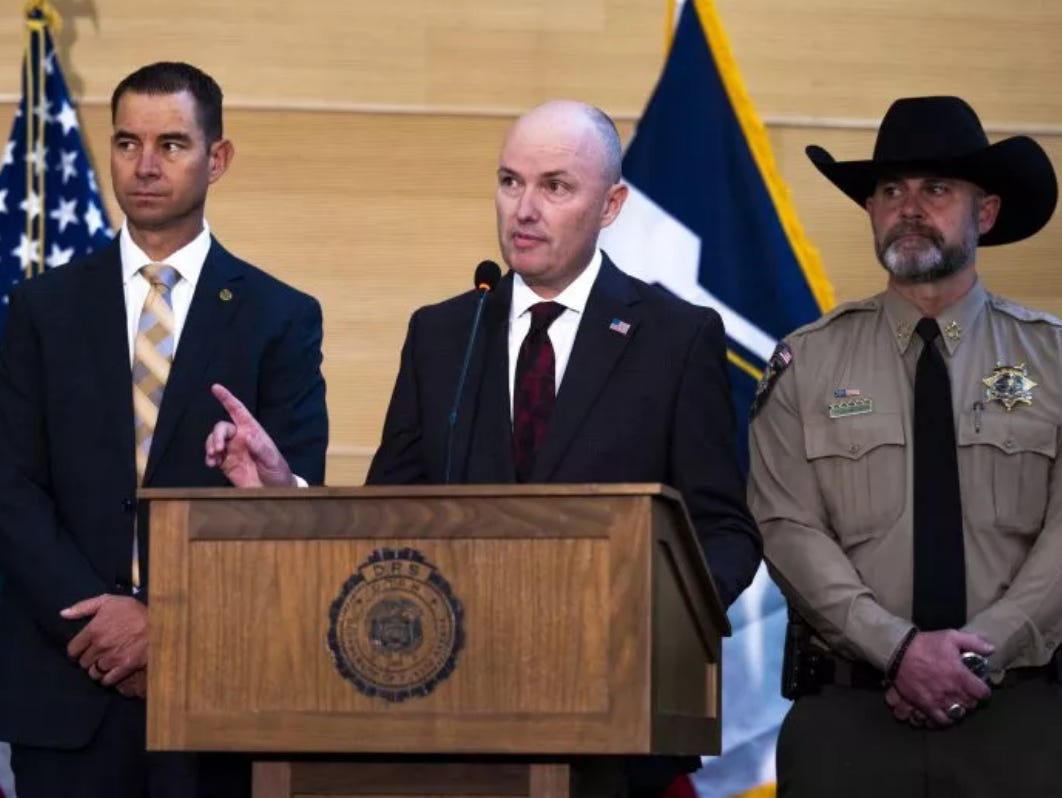The Rise of the Human Primitive: Part Two
Understanding and Addressing the Increase in Political Violence (Vol. 5; Issue 37)
Yesterday I wrote about the violent rhetoric dominating the media since the murder of Charlie Kirk and the complex and dynamic factors contributing to the rise in these shootings. I also discussed Melanie Klein’s explanation of primitive psychological mechanisms—namely splitting and projection—and how they relate to the immature thinking that dominates today’s social media rhetoric, fomenting division and paranoia.
So where do we go from here?
Utah GOP Gov. Spencer Cox, speaking at the height of his distress over the assassination, held a press conference where he addressed how people can embrace social media at the expense of humanism. He feared that young people “are inheriting a country where politics feels like rage,” one in which “it feels like rage is the only option.” He said:
This is our moment: Do we escalate or do we find an off-ramp?
Full of emotion himself, Cox added:
It’s a choice.
In a CNN interview after the assassination, Steve Bannon, a man who deliberately uses splitting and projection to provoke divisiveness, called Governor Cox “completely woke” and a “national embarrassment.” Cox responded by warning against listening to “conflict entrepreneurs who benefit from radicalizing us,” adding that political opponents need not “sing kumbaya and hold hands” but should “actually disagree” without resorting to violence.
Amen.
Wherever the blame lies, many people around the world, like Bannon, Musk, Loomer, and Trump, luxuriate in their use of splitting and projection. They cannot think critically. They consistently look to the other to blame. Writing about mature reactions centuries ago, the Roman philosopher Marcus Aurelius (175ACE/2006) noted:
When people injure you, ask yourself what good or harm they thought would come of it. If you understand that, you’ll feel sympathy rather than outrage or anger. Your sense of good and evil may be the same as theirs, or near it, in which case you have to excuse them … Is that so hard? (Book 7, Section 26)
Yes, it is hard.
But, the choice to which Cox refers lies before all of us. We can ignore these ever-growing, clarion calls for regression. Social media deserves much of the blame for society’s developmental backsliding. Attention spans have shortened. Digital media feeds information intended to create splits. It sifts out the gray and promotes concrete, black-and-white thinking. The world is never that simple.
Perhaps most importantly, the way these media platforms reduce real feeling human beings into 280 character statements eliminates the possibility of empathy. The digitally immersed person loses the sense of how violence or hateful speech hurts people. They forget the love that binds us all, the community on which all of us social animals depend. How many of those hateful statements noted above would be delivered to another person at a dinner party?
The use of social media by minors or by anyone while they are attending school (at any level, including graduate school), calls for government control. How ironic that, personally, I lean towards the type of anarchism Noam Chomsky (2013) describes, meaning that laws should have clear logic to them. Crosswalks are an obvious example. The 88,000-page tax code provides an opposite example. It illustrates a blatant perversion of law, particularly since it favors the rich. Neither tax lawyers nor federal judges can fully grasp it. It is an outrage.
In any event, preventing children from losing their capacity for critical thinking through reliance on social media and AI calls for legal control. Ideally, governments will come to view these forms of media as like the cigarette smoking of the 1970s or the worries about alcohol consumption in our era.
Returning to the diminishment of maturity and the related decrease in simple human kindness, consider Aurelius’ words applied to Tyler Robinson, the assassin himself. Obviously, a lost, perhaps mentally disturbed person, that young man’s life is now as ruined as the lives of Kirk’s family. It is as destroyed as the lives of the Robinson family, probably in hiding now due to death threats. Is such polarization, such threats of actual violence, characteristic of the civilization we desire?
Many voices call for global citizens to relinquish their use of splitting and projection. Aren’t we, in truth, one human family? Like the literal meaning of yin and yang, we humans will always struggle with the conflict between identifying with our small group versus identifying with humanity. Social media encourages the former, e.g., crush the left by the power of the state or “beat the hell” out of the lunatic leftists.
The way every stray impulse can instantly enter the minds of millions translates into a loss of what is meant by the word, society. Social media’s hold on humankind exceeds George Orwell’s (1949/1961) worst nightmares. Big Brother is already in charge. He calls on us to behave like our most primitive ancestors. The question is:
Must we?
And,
Can we resist the impulse and strive for mature dialogue?
Like Utah governor Cox tearfully uttered last week:
It’s a choice.
Enjoying this newsletter?
And check out my book, Lover, Exorcist, Critic: Understanding Depth Psychotherapy, available on Amazon.
References
Aurelius, M. (175ACE/2006). Meditations. Trans. M. Hammond. New York: Penguin.
Chomsky, N. (2013). On anarchism. New York: The New Press.
Klein, M. (1948). A contribution to the theory of anxiety and guilt. International Journal of Psychoanalysis, 29, 114-123.
Klein, M. (1957). Envy and gratitude. Psyche, 11:241-255.
Orwell, G. (19491961). 1984. New York: Signet Classic.


